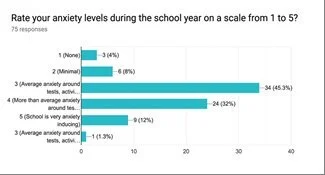Grade Anxiety & Wellbeing
Background: This observational study of 75 participants presents an examination of the connection between cognitive and mood changes in connection to academic performance, grade anxiety, test anxiety, stress, and communication apprehension. Objectives: This study examines the underlying mechanisms vs. driving forces behind the concept of ‘grade obsession’, as well as the internal and external factors affecting academic grades. Furthermore, the study analyzes the potential detrimental effects of grade obsession in psychological terms, specifically on self-esteem and overall mental health. Method: Monitoring self-reported evaluation of received grades, perceived academic performance, and psycho-social components of academic effort and external vs. internal locus of control. Results: The study indicates that test anxiety increased over the semester, although many students reported lower stress or anxiety in an open-ended survey question. Mathematics Anxiety (MA) and Test anxiety (TA) were positively correlated with the number of voluntary reassessments students attempted, while communication apprehension was negatively correlated. Conclusion: The findings suggest that standards-based grading is an assessment framework that can provide alternate methods for some students to demonstrate content mastery. While this study was conducted in mathematics courses, the findings on test anxiety are likely to extend to other disciplines.
https://www.researchgate.net/publication/340901408_Emotional_and_Cognitive_Responses_to_Academic_Performance_and_Grade_Anxiety
